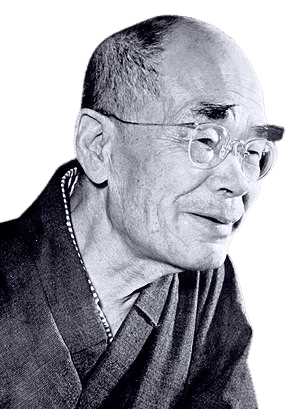Life and achievements
Early life
D.T. Suzuki was born in 1870 in Honda-machi, Kanazawa, Japan, into a family from the declining samurai class. Suzuki, who grew up under impoverished conditions after his physician father passed away, was raised by a single mother. These early experiences of suffering formed the basis of what would come to be his brooding personality and philosophical contemplation about suffering and spirituality.
During Suzuki's early childhood, he received education in Tokyo, where he came across Buddhism, especially Zen. He adopted Zen master Soyen Shaku as his teacher and started practising Zen at Engaku-ji temple, one of Kamakura's most famous Zen temples.
Suzuki attended Waseda University and, a year later, the University of Tokyo, where he studied Chinese, Sanskrit, and Western languages to better understand Buddhist literature. He developed a profound interest in philosophy and religion throughout his career, marrying the world's most distinguished Zen and Mahayana Buddhism scholars.
In 1897, he went to the United States to help Paul Carus, a German-American scholar of religion, translate the Buddhist scriptures into English. This was the starting point of Suzuki's extensive involvement in the Western world through which he was to introduce Zen to the world.
Legacy
D.T. Suzuki's heritage lies in the fact that he introduced Zen into the European-American world, thus making it comprehensible for scholars, philosophers, and devotees. His works, translations, and lectures became a bridge between Eastern spiritual practices and Western rationalism, the effects of which will remain felt throughout both worlds.
Suzuki's introduction of Zen was perfect and came at a time when Westerners were infatuated with Eastern spirituality in the early part of the twentieth Century. He was also helpful in defining Zen not only as a religion but as a philosophy and psychology, with Zazen and Dogen as the main approaches to understanding the world.
Suzuki's impact was not limited to the scholarly world either. His ideas appealed to critical Western thinkers like Carl Jung and Alan Watts, and the Beat Generation writers like Jack Kerouac, who saw a way out of the world of the West's Western intellectual trap in Zen.
Suzuki's focus on the concepts of 'awareness' and 'being in the moment' became the cornerstone of what would eventually become the mindfulness movement that erupted globally. His book Zen and Japanese Culture, published in 1938, was especially useful in explaining to Western readers how Zen was used in Japanese everyday life, including art and swordsmanship.
Regarding his concept of enlightenment, Suzuki also pursued Shin Buddhism, which belongs to the Pure Land Buddhism, in his later years. He thought Zen and the Pure Land faith were two vehicles to enlightenment. The comprehensiveness of his vision of Buddhism is still prevalent among Buddhist followers and scholars; many of his books are still being published even today, many years after his passing.
Suzuki's writings and teachings are a way to learn Eastern traditions, bring them to the Western world, and reveal the secrets of the mind, existence, and practice.
Milestone moments
Mar 12, 1897
Americanization and Partnership with Paul Carus
In 1897, D.T. Suzuki went to America to help Paul Carus, a German-American philosopher and religious scholar, translate Eastern literature.
Suzuki's teacher, Soyen Shaku, acquainted Carus with Zen Buddhism at the 1893 World Parliament of Religions in Chicago, which formed a basis for their cooperation.
This was a significant action by Suzuki in that it introduced him to the first meaningful contact with the Western world.
However, his primary work of introducing Zen Buddhism to the West through his translations and writings had yet to begin.
Feb 20, 1927
Publication of Essays in Zen Buddhism
In 1927, Suzuki published Essays in Zen Buddhism, the first systematic presentation of Zen in English and systematically covered its structure and literature.
The essays provided an understanding of Zen's principles of enlightenment, koan usage, and features of Zen training, which are essential to making the Zen tradition easily understandable for people without a Japanese background.
This publication became one of the first and most important texts on Zen in the Western world, and it was necessary in initiating a wider interest in Oriental spirituality among the intelligentsia and spiritual seekers.
Mar 13, 1938
Publication of Zen and Japanese Culture
Suzuki published Zen and Japanese Culture in 1938. He analyzed the impact of Zen on Japanese tradition in art, tea ceremonies, painting, and martial arts.
The book went further to show how Zen was integrated into society and its functions, thus providing a more comprehensive view of its utility in Japan.
This work also helped define Suzuki as a foremost translator and explicator of Zen's cultural and philosophical aspects to the West.
It contributed to the burgeoning fascination with Japanese culture and aesthetics.
Mar 6, 1952
Appointment at Columbia University
In 1952, Suzuki was invited to Columbia University to teach Buddhist philosophy to Western scholars, a new phase in his relationship with the West.
These lectures were highly popular, and the audience included students and famous writers and philosophers such as T.S. Eliot and Aldous Huxley, eager to familiarize themselves with Zen and its relations to the Western tradition.
This period helped Suzuki establish himself as the leading authority on Zen Buddhism in the West and created the foundation for spreading Zen worldwide.
